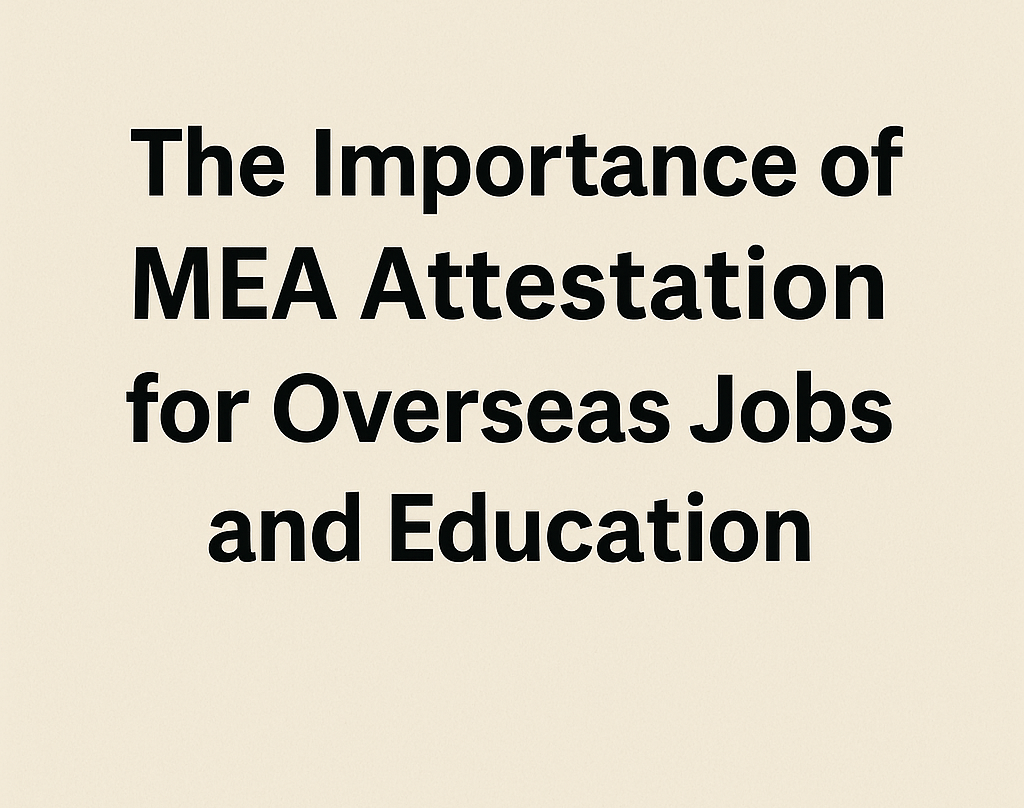Importance of MEA Attestation for Jobs & Education
Discover why MEA attestation is essential for overseas jobs and education. Learn about the MEA attestation process and the documents required to ensure your credentials are recognized internationally.
8/21/20254 min read


Understanding MEA Attestation
The Ministry of External Affairs (MEA) attestation is a critical process in the validation of various documents that individuals require for overseas jobs and educational opportunities. This process serves to authenticate certificates and documents such as educational qualifications, marriage certificates, and other legal documents, indicating that they are genuine and can be relied upon by foreign authorities.
Primarily, MEA attestation acts as a safeguard against potential fraud, ensuring that the documents presented abroad meet the relevant legal standards set by the foreign governments. It is essential for individuals looking to work, study, or settle in a different country, as many countries mandate this verification to uphold their own requirements for foreign applicants. Failure to comply with these requirements could lead to complications or even denial of entry or employment.
It is important to distinguish between different processes related to document validation. While attestation involves the verification of the authenticity of documents by the MEA, verification typically refers to a broader range of checks, possibly by educational institutions or employers in the destination country. On the other hand, an apostille is a specific type of certification under the Hague Apostille Convention, offering a different layer of authentication primarily needed for documents meant to be used internationally in countries that are part of this agreement. Thus, understanding these distinctions is crucial for individuals preparing their documents for overseas use.
In summary, MEA attestation is a vital step in validating important documents for those aspiring to pursue international opportunities. By ensuring the authenticity of such documents, the MEA facilitates a smoother transition for individuals moving abroad, aligning with the legal frameworks of their destination countries.
The Importance of MEA Attestation for Employment
MEA attestation is a critical requirement for securing employment opportunities abroad. When individuals seek jobs in foreign countries, employers often demand verified documentation to corroborate applicants' qualifications and professional experiences. This process is essential, as it assures employers of the authenticity of the presented credentials. Without MEA attestation, candidates may face hurdles that can jeopardize their chances of securing desired positions.
Foreign employers frequently encounter fraudulent documents, prompting them to mandate attestation to validate educational and professional qualifications. For instance, an applicant may have impressive educational qualifications on paper; however, without the MEA stamp of authenticity, the credibility of these documents can be questioned. In many cases, potential employers have outright denied opportunities to applicants lacking verified credentials, impacting their professional aspirations adversely.
Consider the example of a qualified engineer who secured an interview with a prominent multinational company. Despite excelling in technical assessments, the individual's lack of MEA attestation for their degree led to the dismissal of their application. The company insisted on verification to meet regulatory standards, underscoring the necessity of attestation in international job markets.
Furthermore, employers critically assess the reliability of a candidate's qualifications, particularly in competitive sectors. This scrutiny extends to educational attestations, which provide insights into an applicant's academic legitimacy. Therefore, obtaining MEA attestation not only enhances an applicant’s credibility but also significantly improves their chances of securing employment abroad. The global job market is evolving, and MEA attestation increasingly plays a vital role in enabling individuals to take advantage of international career opportunities.
MEA Attestation for Higher Education Abroad
The process of pursuing higher education abroad involves various steps, one of which is the requirement for MEA attestation. The Ministry of External Affairs (MEA) attestation serves as a crucial verification process for documents such as educational certificates, degree diplomas, and other relevant papers. Universities and colleges in foreign countries often mandate attested documents as part of their admission criteria. This requirement underlines the importance of MEA attestation, ensuring that the documents submitted are genuine and have been officially verified by the relevant Indian authorities.
When applying for international programs, students must present a portfolio of documents that typically includes academic transcripts and degree certificates. In many cases, universities specifically state that only MEA-attested documents will be accepted. This attestation not only affirms the authenticity of the documents but also reflects the credibility of the applicant. Without proper MEA attestation, students may face application rejections or significant delays in their admission process, hindering their chances of securing a place at their desired institution.
The absence of MEA attestation can have far-reaching consequences, impacting not only the immediate application but also future academic opportunities. Institutions may have strict policies regarding document verification, and failure to comply with attestation requirements could result in a loss of a valuable opportunity for higher education abroad. Therefore, understanding the necessity of MEA attestation is essential for students aspiring to study overseas.
Ultimately, MEA attestation acts as a critical step in a student's journey towards international education. It aids in a seamless transition into the academic environment of another country, ensuring that all documentation meets the admission standards set by foreign universities. In turn, this smooth process enhances the overall educational experience and paves the way for successful academic pursuits abroad.
Steps and Process of Obtaining MEA Attestation
Obtaining MEA attestation is a systematic process that requires careful attention to detail. To assist individuals in navigating this essential step for overseas employment or education, a clear step-by-step guide is presented below.
Firstly, gather the necessary documents. The documents that require attestation typically include educational certificates, experience letters, or any other official documents relevant to your purpose. Make sure that these documents are original and possess relevance to your application.
Next, you need to verify your documents through appropriate channels. For educational certificates, this could mean getting them verified by the issuing university or board. For employment-related documents, your previous employer may need to authenticate them. This verification is crucial as it lays the foundation for the subsequent attestation by the Ministry of External Affairs (MEA).
Once the documents are verified, you can proceed to apply for MEA attestation. This can be done by visiting the official MEA website or through authorized agencies that specialize in document attestation services. It’s advisable to compare fees and services offered by different agencies, as they can vary significantly.
You will typically need to fill out an application form and submit it along with your verified documents. The application often requires details such as the purpose of attestation and your personal information. Ensure you provide accurate details to avoid any delays.
Regarding timelines, the attestation process may take anywhere from a few days to several weeks, depending on the complexities involved and the agency used. Therefore, it is advisable to plan ahead, especially if you have deadlines looming for overseas jobs or education.
Finally, you will need to pay the associated fees for the attestation service. This fee generally includes both the MEA attestation charge and any charges levied by the verification agencies. Make sure to keep all receipts and confirmations for your records.
Expert
Your trusted partner for document attestation services.
Contact NOw:
Support
+91 9210776391
© 2025. All rights reserved.
